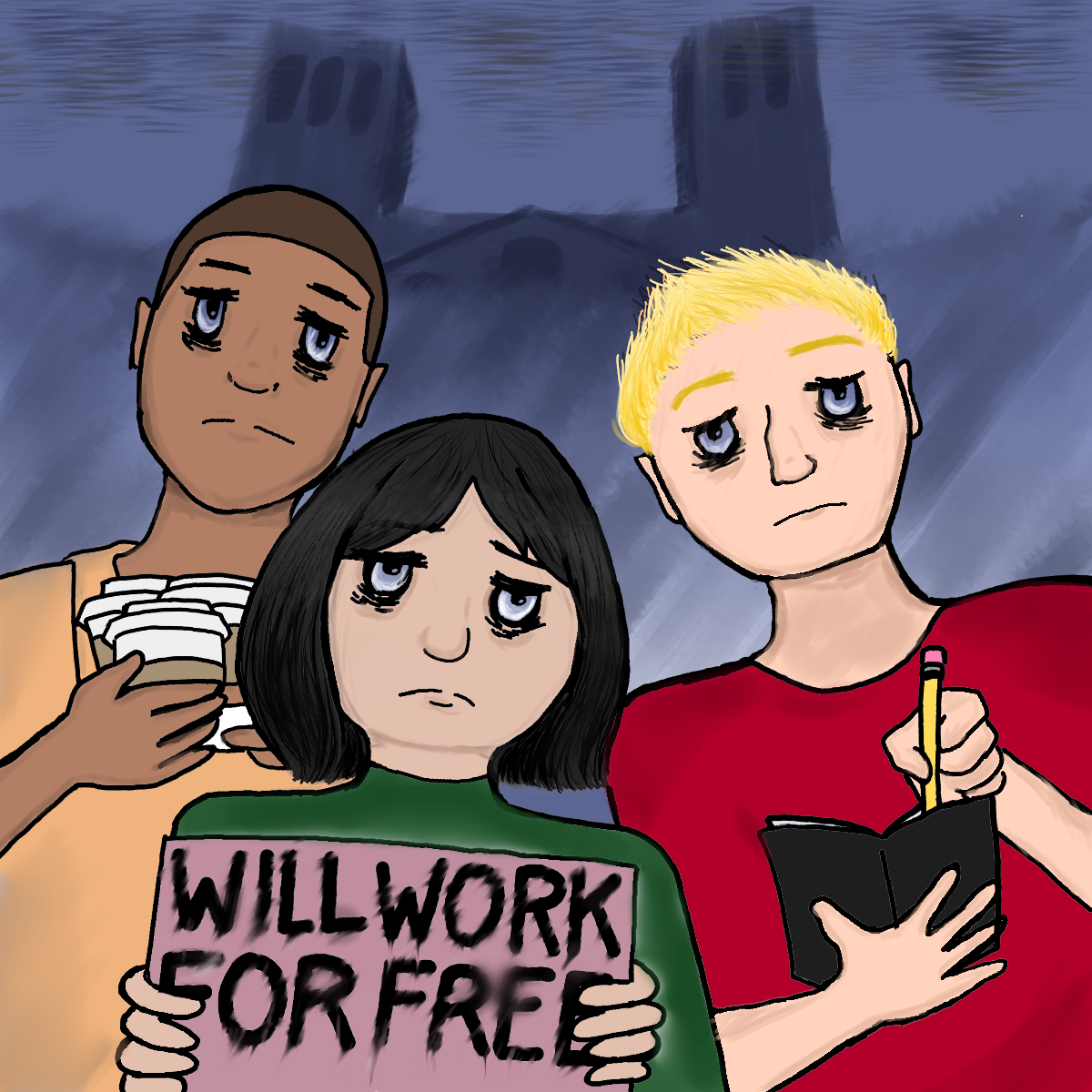The Quad: Unpaid internships provide valuable work experience, but can perpetuate privilege

(Emi Nakahara/Daily Bruin)

By Karen Im
Nov. 12, 2019 5:16 p.m.
Everyone knows you must start at the bottom in order to get to the top.
Internships are seen as a method to open doors to higher professional pursuits and opportunities, but what happens when only a certain population can walk through those doors?
In today’s professional climate, internships are considered crucial entry points for beginning one’s career. To get a paid opportunity, one must first have experience in their field at the most rudimentary level – and this often comes in the form of an unpaid, entry-level internship.
While discussions in the past have grappled over the true educational value of internships and the role of interns as “exploitative labor,” newly emerging discourse has shifted the spotlight toward the controversial function of unpaid internships as a divisive tool of privilege in American society.
A misnomer at its core, an unpaid internship is actually making someone pay – the intern – and it is an expensive pursuit at that. Famously spoken, time is money, and it costs money to give away your time for free. The price tag of an unpaid internship may culminate to how much one might earn in a paid opportunity plus living costs including housing, transportation and more.
However, many students believe this cost is a worthwhile long-term investment in their future.
This may hold true in the case of fourth-year history student Sharon Choi, who, after working at a law firm as an unpaid intern for the past year and a half, was recently promoted to a paid paralegal position.
Choi said that depending on the company, they will either hire within the workplace or cycle through short-term interns, without ever asking them to stay for a longer period. However, the experience one gains from an internship can go a long way in securing future positions elsewhere.
“I believe that some experience is better than none,” Choi said. “And unpaid internships are a way to get your foot in the professional world when there aren’t many other options.”
According to recent data from American Public Media’s “Marketplace” and The Chronicle of Higher Education, it seems this investment may be worthwhile. The valuable experience gained from internships is listed as one of the most important things considered by employers when recruiting graduates. Seventy-nine percent of employers also said unpaid internships have a positive impact on an individual’s application.
Choi said that while she feels fortunate to have found an internship that paid for her transportation and food expenses, but she understands the generally divisive nature of unpaid internships, especially against the backdrop of the UCLA community’s prominent wealth gap.
“There are a lot of students here that are working just to afford attending UCLA, while there are others that do have the financial stability and freedom to be able to work unpaid,” Choi said.
For students who are placed in a situation where they must prioritize paid work in order to financially support themselves, taking on an unpaid internship is no longer an easy option.
Darren Ung, a third-year Asian American studies student, feels that being self-sufficient and working to alleviate financial burden on his family is a top priority. Ung has been working at UCLA’s counter-service cafe, Rendezvous, since the spring quarter of his first year.
In addition to a consistent income and flexible working hours, Rendezvous provides meals for free and is only a short walk away from student dorms and apartments, allowing workers to save money on food and transportation.
As a full-time student and club volleyball player who identifies with a low-income background, Ung said the job is convenient for his busy schedule, and is the more financially realistic option than an unpaid internship.
“It is easier for students who do not immediately have to worry about finances to take on unpaid opportunities,” Ung said. “Unpaid internships would be great on my resume, but how am I going to pay for Ubers, Lyfts, car payments, gas and food?”
Ung is not alone in his sentiments – according to a study conducted by The Hill, 69% of 700 surveyed undergraduate students said they are unable to afford an unpaid internship.
In a system where privilege often follows privilege, it seems that working-class students who cannot afford to take on unpaid internships are actually the ones who would most benefit from the experience and networking.
This raises another important question: Have internships become just another way to marginalize minority students who don’t come from wealth? Do these positions allow privilege to mold key fields such as politics and journalism, which would benefit from diverse perspectives?
Ung said if all interns were required to be paid at least minimum wage, the playing field for student access to internships could be leveled to help build a more diverse workforce.
“This would help students that don’t come from affluent backgrounds because we would be able to kill two birds with one stone, by getting both the experience and the paid work,” Ung said.
Internships are not accessible to all populations, but it is clear that in some cases, these internships may be the prerequisites required for success in the professional world.
“These opportunities can be one person’s gateway to career development, but another person’s barrier to success,” Choi said.

